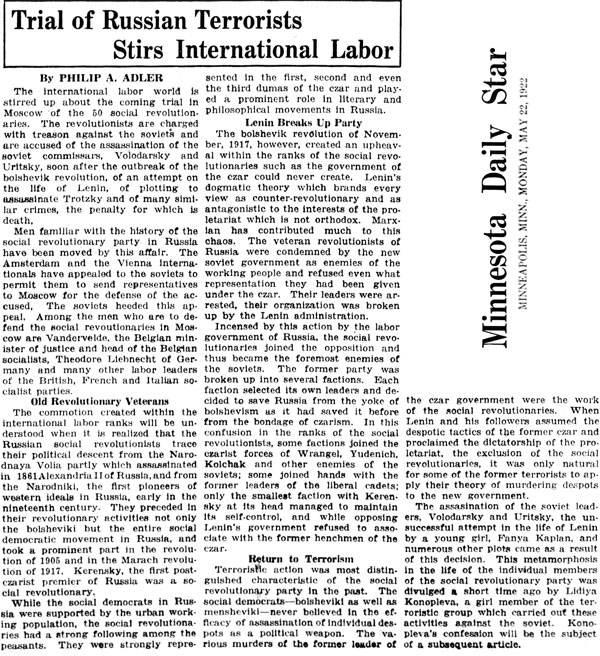The dark days when Russian Social Revolution was stamped out & crushed by Lenin's despotic Soviet Imperialism.
 Jailed Socialists Clamor Against Bolshevik Tyranny Sun, Sep 26, 1920 – Page 1 · The Philadelphia Inquirer (Philadelphia, Pennsylvania) · Newspapers.com
Jailed Socialists Clamor Against Bolshevik Tyranny Sun, Sep 26, 1920 – Page 1 · The Philadelphia Inquirer (Philadelphia, Pennsylvania) · Newspapers.com
The Minneapolis Star Minneapolis, Minnesota Monday, May 22, 1922 - Page 4
Trial of Russian Terrorists Stirs International Labor
By PHILIP A. ADLER
The international labor world is stirred up about the coming trial in Moscow of the 50 social revolutionaries. The revolutionists are charged with treason against the soviet's and are accused of the assassination of the soviet commissars, Volodarsky and Uritsky, soon after the outbreak of the bolshevik revolution, of an attempt on the life of Lenin, of plotting to assassinate Trotsky and of many similar crimes, the penalty for which is death.
Men familiar with the history of the social revolutionary party in Russia have been moved by this affair. The Amsterdam and the Vienna internationals have appealed to the soviets to permit them to send representatives to Moscow for the defense of the accused. The soviets heeded this appeal. Among the men who are to defend the social revolutionaries in Moscow are Vandervelde, the Belgian minister of justice and head of the Belgian socialists, Theodore Liehnecht of Germany and many other labor leaders of the British, French and Italian socialist parties.
Old Revolutionary Veterans
The commotion created within the international labor ranks will be understood when it is realized that the Russian social revolutionists trace their political descent from the Narodnaya Volia partly which assassinated in 1861 Alexandria II of Russia, and from the Narodniki, the first pioneers of western ideals in Russia, early in the nineteenth century. They preceded in their revolutionary activities not only the bolsheviki but the entire social democratic movement in Russia, and took a prominent part in the revolution of 1905 and in the Marach revolution of 1917. Kerensky, the first post-czarist premier of Russia was a social revolutionary.
While the social democrats in Russia were supported by the urban working population, the social revolutionaries had a strong following among the peasants. They were strongly represented in the first, second and even the third dumas of the czar and played a prominent role in literary and philosophical movements in Russia.
Lenin Breaks Up Party
The bolshevik revolution of November, 1917, however, created an upheaval within the ranks of the social revolutionaries such as the government of the czar could never create. Lenin's dogmatic theory which brands every view as counter-revolutionary and as antagonistic to the interests of the proletariat which is not orthodox. Marxian has contributed much to this chaos. The veteran revolutionists of Russia were condemned by the new soviet government as enemies of the working people and refused even what representation they had been given under the czar. Their leaders were arrested, their organization was broken up by the Lenin administration.
Incensed by this action by the labor government of Russia, the social revolutionaries joined the opposition and thus became the foremost enemies of the soviets. The former party was broken up into several factions. Each faction selected its own leaders and decided to save Russia from the yoke of bolshevism as it had saved it before from the bondage of czarism. In this confusion in the ranks of the social revolutionists, some factions joined the czarist forces of Wrangel, Yudenich, Kolchak and other enemies of the soviets; some joined hands with the former leaders of the liberal cadets; only the smallest faction with Kerensky at its head managed to maintain its self-control, and while opposing Lenin's government refused to associate with the former henchmen of the czar.
Return to Terrorism
Terroristic action was most distinguished characteristic of the social revolutionary party in the past. The social democrats—bolsheviki as well as mensheviki—never believed in the efficacy of assassination of individual despots as a political weapon. The various murders of the former leader of the czar government were the work of the social revolutionaries. When Lenin and his followers assumed the despotic tactics of the former czar' and proclaimed the dictatorship of the proletariat, the exclusion of the social revolutionaries, it was only natural for some of the former terrorists to apply their theory of murdering despots to the new government.
The assassination of the soviet leaders, Volodarsky and Uritsky, the unsuccessful attempt in the life of Lenin by a young girl, Fanya Kaplan, and numerous other plots came as a result of this decision. This metamorphosis in the life of the individual members of the social revolutionary party was divulged a short time ago by Lidiya Konopleva, a girl member of the terroristic group which carried out these activities against the soviet. Konopleva's confession will be the subject of a subsequent article.























